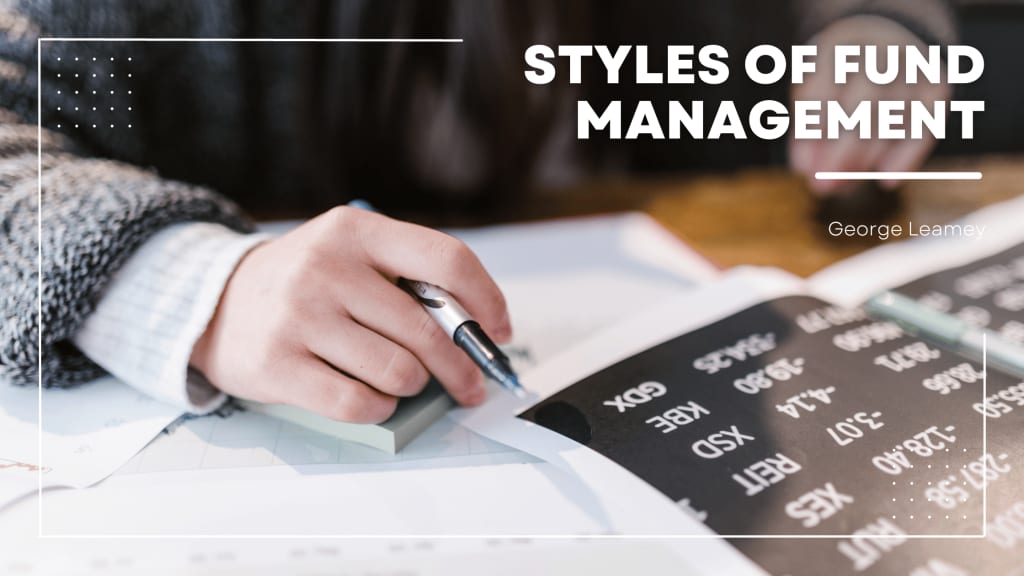Styles of Fund Management
George Leamey explains the most popular styles of fund management for investors

If you are interested in investing, it’s important to consider the different styles of fund management and how you want to structure your strategy. Some investors like to take risks and trade their portfolios regularly, while others like to rely on steady growth and hang onto their investments for a long time. Depending on personal preference, there are a variety of styles and approaches that might be a good fit. Here is a brief overview of the major fund management styles and some key things to consider before getting started.
Active vs. Passive
Most investing falls into one of these two categories: active and passive. In active investing, investors or money managers select holdings carefully to pursue larger returns. This requires extensive research and attention and can be more costly if you hire someone else to manage the funds.
On the other hand, passive investing relies on the general principle that passive investments will yield higher returns over time. These kinds of funds and investments do not require constant research and management like active investing, so there are fewer fund expenses to manage.
Growth vs. Value
Another common distinction is growth versus value funds. Growth investing relies on sticks from rapidly growing companies with positive projected growth. They tend to have a high price-to-earnings ratio, and while they don’t usually have a high dividend, they do have the potential to provide strong returns.
If you don’t want to navigate overvalued growth stocks, you can choose to focus on out-of-favor stocks that might be undervalued. Warren Buffett has popularized this concept and operates on the assumption that the selected securities will eventually rise in value.
Small Cap vs. Large Cap
Investors also tend to have a preference for the size of the company they invest in. This is based on market capitalization, and companies are typically considered either “small-cap” or “large-cap” based on their number of outstanding shares multiplied by the share price.
Some investors prefer small-cap companies that are more flexible and have more room for growth. However, due to having fewer resources, this can be a volatile investment option. Small-cap investors must be comfortable with a level of risk.
Large-cap companies are typically more dependable and include prominent brand names such as GE or Microsoft. These companies typically won’t have exponential growth but will stand the test of time and provide consistent returns over the years.
Buy and Hold
A subset of passive investing, buy-and-hold investors tend to hang onto their investments for a long time. They prioritize long-term growth and avoid trading in their portfolio most of the time. They look for low-priced stocks and play the long game, waiting for them to grow over time before cashing in.
Indexing
Another variation is indexing. This is done by investing in index mutual funds or ETFs and building a portfolio that reflects the companies contained in a specific stock index. This is a low-cost way to build a diversified portfolio that is also pretty straightforward if you aren’t comfortable with extensive research. Indexing also has low transaction costs and taxes.
Dividend Growth
Finally, dividend growth is a popular style for investors approaching retirement age. This shifts the focus away from asset growth and capital gains to simply relying on a steady income and cash flow. Successful dividend growth is achieved by investing in companies with stable and growing dividends.
In the end, there is no perfect fund management style, and no investment is guaranteed. The style you choose heavily depends on your comfort with risk, your budget, and the level of involvement you want to have. You may even find that a combination of styles works best for your portfolio and strategy.
About the Creator
George Leamey
George Leamey is a Melbourne, Victoria, Australia-based entrepreneur, financial expert, and adventurer. He owns Kobo International. Visit GeorgeLeamey.org.
Enjoyed the story? Support the Creator.
Subscribe for free to receive all their stories in your feed. You could also pledge your support or give them a one-off tip, letting them know you appreciate their work.






Comments (1)
Sure. Thx for the Investopedia. What about how people "invest" with scammers like you and lose their money? https://leameygeorge.com